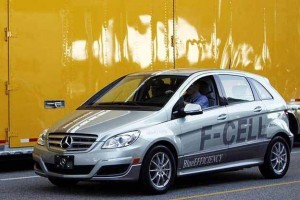Ford, Daimler and Nissan will now team up in a push to bring hydrogen fuel cell technology to market as early as 2017, the makers have announced.
They collectively hope to produce as many as 100,000 fuel-cell vehicles, or FCVs, they revealed during a news conference in Nabern, Germany. Super-clean fuel cells could serve as an alternative to the battery-electric technology all four of the makers have been trying to sell to a so-far skeptical market.
“This technology has the biggest potential for emission- free driving,” said Dr. Thomas Weber, Daimler’s technology chief. “This cooperation gives us the opportunity to bind together the know-how of three experienced partners” to enable commercial production of cars running on the powering system.
The announcement comes less than a week after Toyota and BMW revealed plans to cooperate on their own fuel cell research and development efforts.
(For more on the BMW-Toyota announcement, Click Here.)
The two announcements suggest that fuel cell technology is regaining momentum within an industry that had once hailed it as the power source of the future because of its potential to provide clean and efficient propulsion. The recent developments may also be seen as a shift in focus by an industry frustrated with the technical issues of – and tepid consumer demand for – battery-based vehicles.
The smallest atom and the most abundant in the universe, hydrogen can be used in place of gasoline in a slightly modified internal combustion engine or it can power a fuel cell stack. With the latter technology, the lightweight gas is forced through a permeable membrane covered with platinum and other rare metals that serve as a catalyst. By combining the hydrogen with oxygen from air, a fuel cell stack creates a steady flow of current that can be used to power a vehicle’s electric motors.
But in contrast to a battery car, which suffers from the limited range of even the most advanced lithium-ion batteries, fuel cell vehicles can quickly be refilled with hydrogen, much like a conventional gasoline vehicle. In fact, some experts describe fuel cells as “refillable batteries.”
Another advantage is that vehicles running on hydrogen produce only water vapor in their exhaust.
There are a number of downsides, however. Fuel cell technology is still expensive and difficult to manufacture, something the Ford/Daimler/Nissan collaboration clearly aims to address.
There is also the issue of producing and distributing the super lightweight gas. And storing it, both at a service station and on the vehicle itself, poses enormous challenges.
In a statement outlining the new alliance, the four partners states their hope that, “The collaboration sends a clear signal to suppliers, policymakers and the industry to encourage further development of hydrogen refueling stations and other infrastructure necessary to allow the vehicles to be mass-marketed.”
Ford and Daimler – the parent of the Mercedes-Benz and Smart brands – previously formed a joint venture, the Automotive Fuel Cell Corp., to work together on the hydrogen-based technology. The Japanese half of the Renault-Nissan Alliance will now work under contract with that venture rather than taking a formal stake.
Daimler and Renault-Nissan have already teamed up on a variety of other ventures including joint product development and battery-electric research projects. The members of the alliance said they are open to other partners and it is possible that Renault could join the effort, as well.
The three fuel cell partners will share development efforts at facilities based in Germany, Japan, the U.S. and Canada meaning, “We can proceed quicker,” said Daimler’s Weber, “as we can work around the clock.”
Daimler’s Mercedes brand is already testing a fuel-cell prototype, the F-Cell, and Ford has had several running prototypes, as well.
Fuel cell technology lost momentum in recent years as focus shifted to battery technology. The U.S. Department of Energy pulled research funding from hydrogen and moved it to lithium-ion development. But the DoE recently restored some of that assistance. In Germany, the government has approved a multi-billion-dollar project that would set up a network of hydrogen fueling stations across the country.
Currently in the U.S., there are only a handful of such public facilities available in Southern California.
Joe Szczesny contributed to this report.


I hope this technology is a great breakthrough and becomes safe, reliable and cost effective since Obama and the EPA refuse to allow clean Diesels to be sold in the U.S. without absurd emissions regulations that increase sticker prices and lower mpg. No other country in the world has such screwed up Diesel regs as the Obama administration and the U.S. EPA.
Agreed…to a point. The next Euro diesel regs get much tougher, especially on particulates…and that’s where the latest science e says we should be focused. I do hope diesels gain more traction here.
Paul E.